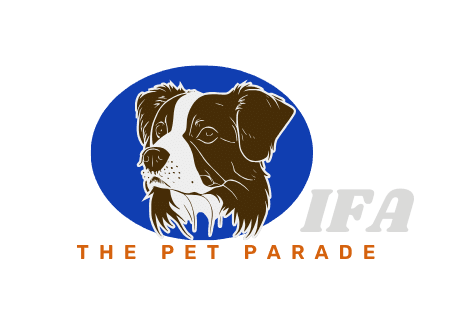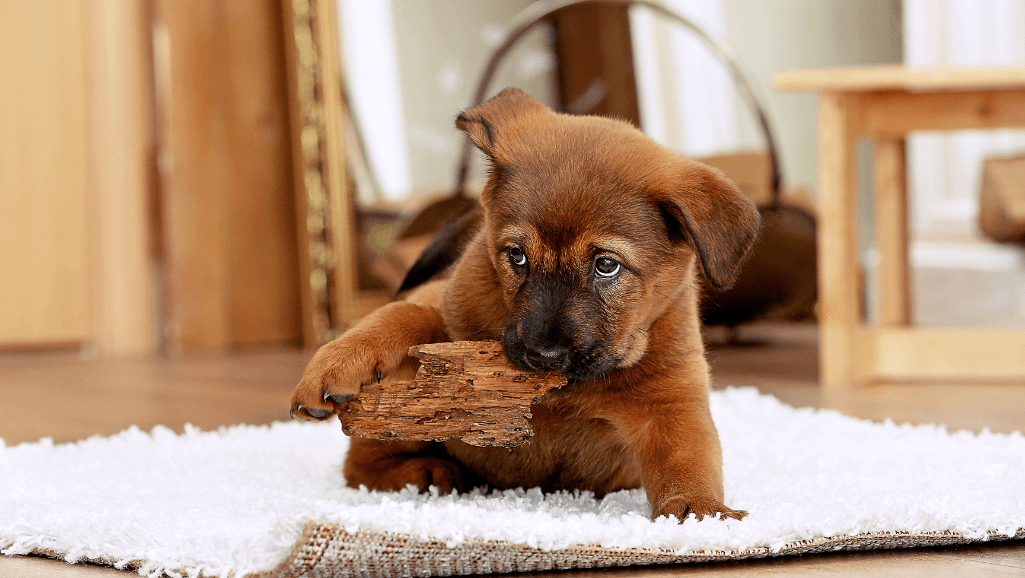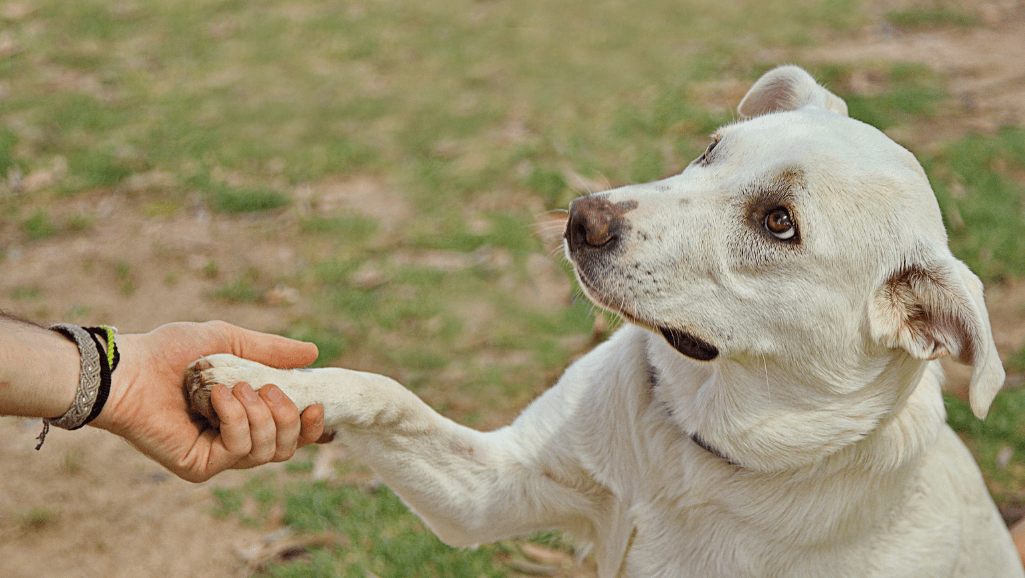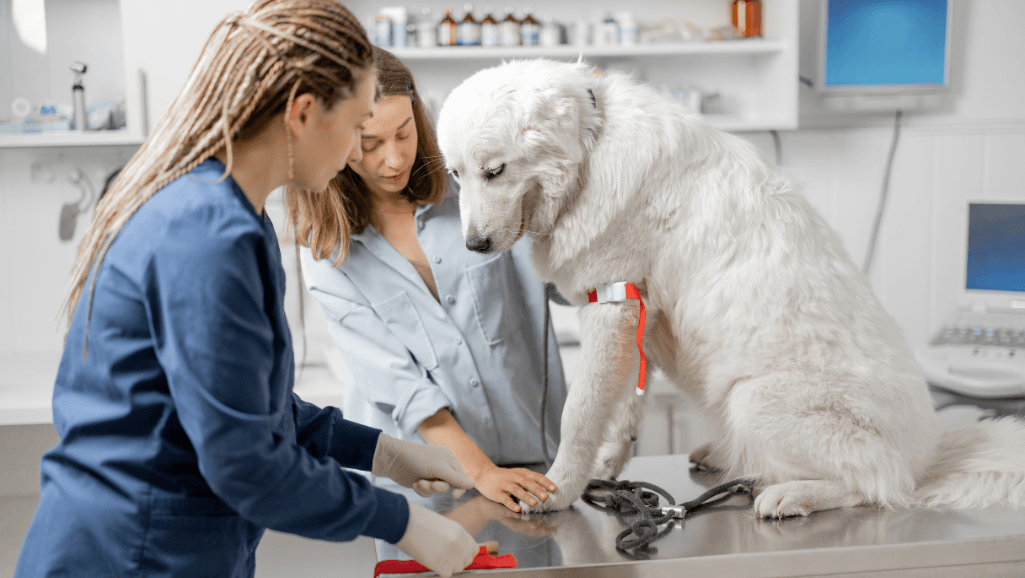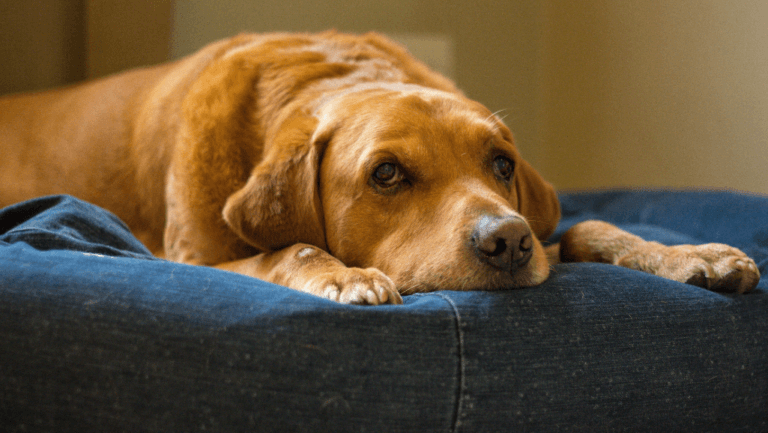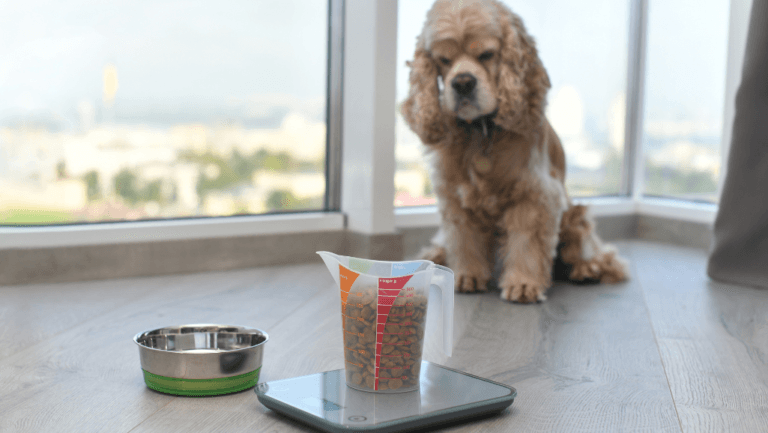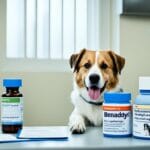If your dog keeps licking, biting, or chewing their paws, it might be a sign of a bigger problem. Normal paw licking is okay, but too much can mean they’re in pain or uncomfortable. As a pet owner, figuring out why your dog is chewing their paws is key. Then, you can find ways to stop it.
Vet Dr. Valentina Henao says allergies can make dogs’ skin and paws itch and get infected. Fleas and ticks can also make dogs lick and bite their paws. This can lead to painful infections that are hard to treat.
Things like weed killers and antifreeze can also make dogs bite their paws. Washing your dog’s paws after walks can help. Poor gut health and food allergies can also cause paw biting, showing the need for a balanced diet.
Stress and anxiety can make dogs chew their paws as a way to feel better. Giving them long-lasting treats can help. Pain from arthritis or injuries can also cause them to chew their paws, so they need vet care.
Key Takeaways
- Why Dogs Keep Chewing Paws.
- Excessive paw chewing in dogs can indicate underlying issues like allergies, pain, or anxiety.
- Allergies, parasites, and bacterial infections can cause paw chewing and require veterinary attention.
- Environmental toxins, poor gut health, and dietary issues can contribute to paw biting in dogs.
- Stress and anxiety may lead to paw chewing as a coping mechanism, necessitating outlets and support.
- Consulting a veterinarian is critical for identifying the cause of paw chewing and finding the right treatment.
Understanding Dog Behavior and Paw Chewing
Dogs do many things that puzzle their owners, like chewing their paws. Sometimes, licking their paws is normal grooming. But, if they chew too much, it might mean they have a problem.
Common Reasons for Paw Chewing
There are several reasons why dogs chew their paws:
- Allergies: Up to 10% of dogs have allergies, making their paws itchy and sore.
- Parasitic infestations: Fleas, ticks, or mites can bother up to 50% of dogs, making them chew their paws.
- Dry skin: Dry, itchy skin can affect up to 30% of dogs, mainly in winter.
- Anxiety or boredom: Around 20% of dogs chew their paws due to stress or boredom.
Other reasons include pain, injury, or skin problems like infections. Finding out why a dog has dog paw allergies is key to fixing the problem.
Behaviors Associated with Paw Chewing
Dogs may show other signs when they chew their paws:
- They might keep licking and chewing, showing they need vet help.
- Changes in their paws, like redness or swelling, could mean an infection.
- They might act differently, like limping or being less active, due to health issues.
Regular grooming can help in 60% of cases. Exercise and mental games can reduce boredom chewing in 25-30% of dogs.
Knowing why dogs chew their paws and what it means can help owners. They can then take steps to make their pets comfortable and avoid long-term problems.
Allergies: A Leading Cause of Paw Chewing
If your furry friend is always chewing on their paws, allergies might be the reason. Allergies are the top cause of chronic paw licking and chewing in pets. They can be triggered by pollen, food, environmental chemicals, and fleas. These allergens can make your pup’s paws irritated, leading them to chew nonstop.
Symptoms like red eyes and nose, itching in other spots, and skin problems can show an allergy in dogs. If not treated, dog paw allergies can cause long-term pain and infections. It’s key to find out what’s causing the allergy and treat it quickly to help your dog feel better.
Environmental Allergies
Environmental allergens like pollen, grass, and dust mites can harm your dog’s sensitive paws. These can cause long-lasting allergy symptoms, needing regular medicine during allergy seasons. Fleas, ticks, and mites also cause a lot of itching and discomfort, making dogs chew their paws a lot.
To fight environmental allergies, keep your dog’s living space clean and free of allergens. Regular vacuuming, washing bedding, and using air purifiers can help. Also, wiping your dog’s paws after going outside can reduce exposure to irritants.
Food Sensitivities
Food sensitivities can also make a dog’s paws itch and chew. Some dogs might be allergic to certain proteins or ingredients in their food, causing skin irritation and itching. If you think your dog has a food allergy, talking to your vet is a good first step.
Your vet might suggest an elimination diet. This means removing possible allergens from your dog’s food and adding them back one at a time to find the problem. Once you know what’s causing the allergy, switching to a hypoallergenic or limited-ingredient diet can help. This can stop your dog’s paw chewing and make them feel better.
Skin Conditions that Cause Discomfort
Dogs can get skin conditions that make them uncomfortable and cause them to chew their paws too much. Pododermatitis is one such condition. It often happens between a dog’s toes and can affect any paw in any dog, at any age or breed.
Some breeds like Boxers, English Bulldogs, and German Shepherds are more likely to get it.
Allergies are the main reason for pododermatitis in dogs. But other things like foreign bodies, trauma, and infections can also cause it. Being overweight or putting too much weight on your legs can also increase the risk.
When allergies are found, treatment might include antibiotics like Cephalexin or Convenia®.
Dermatitis and Its Impact
Dermatitis is another skin issue that can irritate a dog’s paws and make them chew more. It’s caused by allergies, infections, and hormonal problems. Dogs with dermatitis may have red, itchy, and swollen skin, making them uncomfortable and want to chew their paws.
To treat dermatitis, you need to find and fix the cause. This might mean changing their diet, using medicines, or treating infections. Soothing shampoos and topical treatments can also help make them feel better.
Importance of Regular Skin Checks
It’s important to check your dog’s skin regularly. Look for redness, swelling, discharge, or any other unusual changes. Finding skin problems early can stop them from getting worse and making your dog more uncomfortable.
If you see any signs of skin issues or your dog is chewing their paws a lot, see a vet. They can check your dog, do tests, and come up with a treatment plan. This will help your dog feel better and stop them from chewing their paws too much.
Stress and Anxiety in Dogs
Dogs, like humans, can feel stress and anxiety. This can show up in ways like excessive paw licking and chewing. When dogs are anxious or stressed, they might bite their paws as a way to cope.
Signs of Stress in Dogs
It’s key for dog owners to know the signs of stress in their pets. Some common signs include:
- Restlessness and pacing
- Excessive panting
- Whining or barking
- Lip licking and yawning
- Hiding or seeking solitude
If your dog is showing these signs and licking or chewing their paws, they might be anxious.
Coping Mechanisms for Anxious Dogs
There are ways to help your anxious dog feel better. You can:
- Give them a safe, comfy spot to hide when they’re feeling stressed.
- Keep a regular routine to make them feel secure.
- Make sure they get enough exercise and mental play to avoid boredom and anxiety.
- Use positive training to boost their confidence and calmness.
- Get help from a vet or dog trainer for specific advice and treatments.
Anxiety is a common issue for many dogs. But with patience, understanding, and the right approach, you can help your furry friend find relief and reduce their reliance on compulsive behaviors like dog paw licking.
By paying attention to your dog’s emotional needs and working with your vet, you can manage their anxiety. This will help improve their overall well-being.
Boredom: A Common Culprit
When dogs are left alone for too long or don’t get enough to do, they might chew or bite their paws. This is often because they’re bored. Dogs look for ways to entertain themselves when they’re not busy.
Research shows that dogs need daily walks, playtime, and toys to stay happy and not chew their paws. Keeping them active and engaged can stop them from chewing their paws out of boredom.
Activities to Engage Your Dog
To keep your dog happy and active, try these activities every day:
- Interactive puzzle toys that challenge their problem-solving skills
- Regular training sessions to reinforce obedience and teach new tricks
- Engaging in play with your dog, such as fetch or tug-of-war
- Providing chew toys or bones to satisfy their natural chewing instincts
Importance of Mental Stimulation
Mental stimulation is as key as exercise for your dog’s happiness. Activities that challenge their mind help prevent boredom and stress. A dog that’s mentally active is less likely to chew or bite their paws.
A tired dog is a good dog. Providing your furry friend with enough mental and physical stimulation can work wonders in preventing destructive behaviors.
Remember, taking care of your dog’s paws also means stopping them from chewing due to boredom. By spending time on fun activities, you keep your dog’s mind and body healthy. This reduces the chance of them chewing their paws too much.
Infections: Identifying Red Flags
Infections in your dog’s paws can be a big worry. If not treated, they can cause pain, too much chewing, and serious health problems. Knowing the signs of an infection is key for any dog owner.
Look out for bleeding, swelling, limping, pus, or your dog crying when you touch their paws. Seeing these signs means you need to get vet help fast. Waiting too long can make the problem worse.
Types of Infections in Dogs
Dogs can get bacterial or yeast infections in their paws. Bacterial infections happen when cuts or scrapes let bacteria in. Yeast infections come from too much yeast on the skin, often due to allergies or wet conditions.
Other infections include:
- Fungal infections
- Parasitic infections (e.g., mange)
- Viral infections (e.g., canine papillomavirus)
Treatment Options for Infected Paws
If your dog has an infection, your vet will tell you how to treat it. The plan depends on the infection type and how bad it is. Treatments might include:
- Antibiotics for bacterial infections
- Antifungal meds for yeast and fungal infections
- Medicated shampoos or creams
- Proper wound care and cleaning
- Fixing underlying issues like allergies or grooming problems
Keeping your dog’s paws clean and dry is also key. Regular grooming helps prevent infections. Trimming hair and nails is important too.
By watching for infection signs and acting fast, you can keep your dog’s paws healthy. Early action and vet visits are the first steps to solving dog paw problems. Don’t wait if you see your dog chewing at their paws too much.
Grooming and Maintenance
Keeping your dog’s paws healthy is key. Regular grooming helps prevent dog chewing paws. A consistent grooming routine can stop painful or irritating conditions that may cause paw chewing.
How Regular Grooming Helps
Grooming often lets you check your dog’s paws for injuries, infections, or foreign objects. Trimming fur between the paw pads stops matting and debris. Regular baths with mild dog shampoo also help with dry skin issues that may lead to paw chewing.
Regular grooming has many benefits:
- Early detection of skin infections or parasites
- Preventing matted fur and trapped debris
- Maintaining clean, healthy paw pads
- Reducing the risk of dry or cracked paws
Nail Care and Its Benefits
Proper nail care is vital for dog paw treatment. Long nails can be painful and even cause injuries. Regular nail trimming keeps nails comfortable and stops paw chewing due to pain or irritation.
Ensuring there are no foreign bodies stuck in their paws is key.
When trimming nails, avoid cutting too close to the quick to prevent pain and bleeding. If unsure, ask a professional groomer or vet for advice on the right techniques and tools for your dog.
When to Consult a Veterinarian
Dogs sometimes chew their paws, but too much chewing can mean a problem. It’s important to know when your dog needs a vet. This helps them feel better and avoid more issues.
Key Indicators for Seeking Help
Some signs show your dog’s paw chewing is serious. Look out for these:
- Bleeding or swelling in the paws
- Limping or favoring one paw over others
- Presence of pus or discharge
- Signs of pain or discomfort when walking or standing
- Excessive licking or biting that leads to hair loss or skin irritation
Seeing a vet early can help fix your dog’s paw issues. It stops them from getting worse and causing pain.
What to Expect During a Veterinary Visit
At the vet, your dog will get a full check-up. The vet will:
- Inspect your dog’s paws for signs of injury, infection, or foreign objects
- Check for skin allergies, yeast infections, or parasites like fleas and mites
- Assess your dog’s overall health and look for signs of stress or anxiety
- Discuss your dog’s diet, lifestyle, and any recent changes in their environment
After checking, the vet will create a treatment plan. This might include:
- Prescription medications to address infections, allergies, or parasites
- Wound care and bandaging for injuries or sores
- Behavioral modifications to alleviate stress and boredom
- Recommendations for diet changes or supplements to support skin and coat health
“Skin issues are some of the more common reasons dogs chew their paws, with allergies being a leading cause. Environmental allergies, including grass, mold, pollen, dust mites, and mildew, can contribute to paw chewing behavior in dogs.”
By following your vet’s advice, you can help your dog feel better. This stops them from being uncomfortable and frustrated.
Effective Strategies to Stop Paw Chewing
To stop your dog from chewing their paws, you need to find out why they do it. Benjamin Smith, a top dog behavior expert, says using many ways at once works best. This includes changing how your dog acts, taking good care of their paws, and getting help from a vet.
Behavioral Modifications
One great way to stop paw chewing is to give your dog something else to do. Give them fun toys, puzzle feeders, and play with them often. This keeps their mind busy and stops them from chewing their paws.
Being consistent and positive when training helps a lot. It teaches your dog new ways to deal with problems instead of chewing their paws.
Recommended Products and Treatments
There are many things that can help if your dog chews their paws. If they have allergies, your vet might give them medicine or suggest special food. There are also special shampoos and balms for their paws to make them feel better.
If your dog is stressed, there are ways to calm them down. You can try calming supplements or pheromone diffusers. Keeping their paws clean and using natural treatments like Epsom salt soaks can also help.
Working with your vet, changing your dog’s behavior, and using the right treatments can really help. Remember, it takes time and patience to help your dog feel better and stop chewing their paws.
